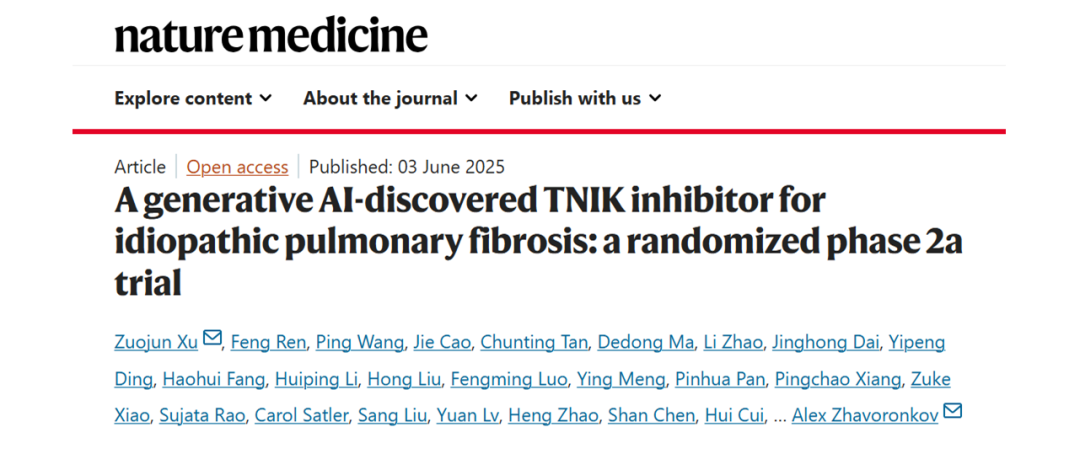Recently, results from a phase 2a clinical trial for treating idiopathic pulmonary fibrosis (IPF), led by Dr. Xu Zuojun's team from the Department of Pulmonary and Critical Care Medicine at PUMCH, were published in the internationally prestigious medical journal Nature Medicine. The clinical trial tested the world's first AI-discovered drug. The study demonstrates that this drug has favorable safety and efficacy profiles, offering new therapeutic hope for patients with IPF.

IPF is a chronic, progressively worsening lung disease, affecting approximately 5 million patients worldwide. The disease causes continuous, irreversible decline in lung function, with a mean survival of only 3-4 years after diagnosis. Current medications can slow disease progression but cannot halt or reverse lung damage, indicating a pressing need for more effective treatments.
In IPF patients, abnormal activation of TNIK accelerates pulmonary fibrosis. Rentosertib, a TNIK inhibitor, is a novel small-molecule inhibitor that works by inhibiting this process, potentially halting or even reversing lung function deterioration. From the identification of the key target TNIK to the design of the drug structure, the whole process was driven by AI. In February, 2023, this drug was granted the orphan drug designation from the U.S. Food and Drug Administration (FDA).
Dr. Xu Zuojun's team conducted the GENESIS-IPF phase 2a clinical trial using a double-blind, placebo-controlled experimental design. The study enrolled 71 IPF patients from 22 research centers, randomizing them to receive placebo or treatment with Rentosertib at different dose levels, with medication lasting 12 weeks.
The study first evaluated the drug's safety profile. Results showed that Rentosertib was well tolerated across all dose groups, with the most common adverse events being mild to moderate diarrhea and liver function abnormalities (both in 14.8% of the patients). All adverse events were resolved upon drug discontinuation, with no serious safety issues observed.
Regarding efficacy, the study focused on changes in patients' lung function metrics and quality of life. Results showed that patients receiving the highest dose (60mg daily) experienced a mean increase of 98.4 ml in forced vital capacity (FVC), the key gold standard of lung function, while the placebo group showed a decline of 20.3 ml. In addition, patients in the high-dose group experienced significant improvement in cough symptoms and a 2-point improvement in quality-of-life scores.
Through blood testing, the study also found that patients in the high-dose group showed significantly reduced levels of profibrotic proteins and increased levels of the anti-inflammatory marker IL-10. These changes were directly correlated with patients' lung function improvements, further confirming Rentosertib's mechanism of action.
Currently, detailed data from this study have been presented at the American Thoracic Society (ATS) 2025 International Conference. Dr. Xu Zuojun stated that these research findings not only bring new hope to IPF patients but also demonstrate AI's tremendous potential in drug development. In the future, AI may become an important catalyst for medical innovation, driving treatment advances for more intractable diseases.
Written by Hong Chengwei and Chen Xiao
Pictures courtesy of Xu Zuojun
Edited by Hong Chengwei and Chen Xiao
